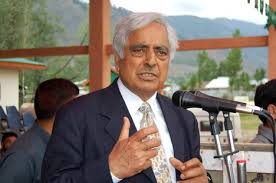J&K Gov. Formation: BJP and PDP Reach Consensus on Article 370, AFSPA, Say Sources
 NEW DELHI Two months after the Jammu and Kashmir verdict, the state today finally moved towards a new government. Highly placed sources have confirmed that the Peoples Democratic Party (PDP) and the BJP have found consensus on the issues that have ideologically divided them for decades.
NEW DELHI Two months after the Jammu and Kashmir verdict, the state today finally moved towards a new government. Highly placed sources have confirmed that the Peoples Democratic Party (PDP) and the BJP have found consensus on the issues that have ideologically divided them for decades.
A carefully negotiated common minimum program brings together what PDP leader Mufti Mohammad Sayeed has described as the “North Pole and the South Pole” in an interview to a TV Channel.
Mr Mufti appears to have got his way with the PDP’s key demand – the sanctity of Article 370. The PDP had demanded a written assurance that the present constitutional status of the state be maintained.
Sources confirm that the BJP and the PDP have agreed on the language that reinforces this formula. The BJP’s manifesto has spoken of the abrogation of the article that gives the state its special position in the Indian Union.
However, the softening of the BJP on this key agenda was evident in the assembly elections when none of its leaders even mentioned it in campaign speeches. On the more contentious issue of the Armed Forces Special Powers Act (AFSPA), sources say both parties have agreed on a formula that allows a gradual reduction of military presence in the state and the Army being replaced by the local police in areas where the security situation has improved.
The PDP’s other key demands have included a reconciliation process with Pakistan and a dialogue with the Hurriyat.
Mufti Mohammad Sayeed said whether one agrees or disagrees with the sentiment of the Hurriyat, it was a sentiment that New Delhi would have to engage with. He described the talks as a “great opportunity” for Prime Minister Narendra Modi to build on the Vajpayee legacy in Jammu and Kashmir.

